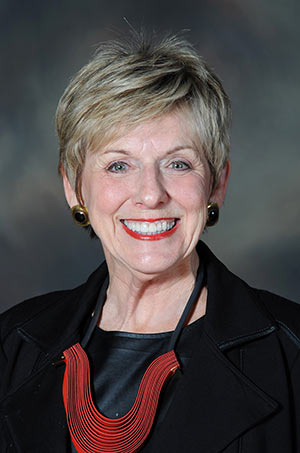You have /5 articles left.
Sign up for a free account or log in.

Linda Flaherty-Goldsmith is the first woman president at Birmingham-Southern College.
Birmingham-Southern College
It has not been an easy decade for Birmingham-Southern College.
In 2010 the small private liberal arts college made millions of dollars in cuts and laid off employees after finding a major financial aid error. Birmingham-Southern had for years been adding Pell Grant totals to student financial aid packages without adjusting its own contribution downward -- an adjustment called for in its policies and those of colleges generally. The estimated cost of the errors came to about $5 million a year for an institution with a $49 million budget at the time.
Birmingham-Southern’s president resigned shortly afterward. Retired General Charles C. Krulak eventually took over as president, holding the role from 2011 until he retired in the spring of 2015. But the president hired to replace him, Edward F. Leonard III, stepped down this month after just one year, without a public explanation.
That is a large number of leadership changes in a relatively short period of time for a small institution trying to recover from a major blow to its books. So perhaps it should not have been a surprise that trustees turned back to a name they knew, Linda Flaherty-Goldsmith, to become the institution’s next president.
Flaherty-Goldsmith started working for Birmingham-Southern in 2010 as a consultant to trustees, then she became Krulak’s chief of staff. She departed in 2013, working as a consultant with the nonprofit group Human Rights First. She is also a veteran of the University of Connecticut and University of Alabama System.
But importantly, Flaherty-Goldsmith was there when Birmingham Southern, under all accounts, managed to regain its financial footing. Now she wants to help it firm up that footing and find leadership stability as well.
“My skills are, perhaps, what the college needs,” said Flaherty-Goldsmith, who signed a renewable two-year contract. “My key vision is that we’re going to think outside of the box, do some innovative things and yet stay true to our role of a liberal arts college.”
Flaherty-Goldsmith wants Birmingham-Southern to grow closer to the communities that surround it on the west side of Birmingham, Ala., seen as a traditionally underdeveloped area. There are whispers of property in the area that could be developed.
But the new president also says the college is in a position to grow without construction. Its enrollment is 1,337 as of September 2015, up from 1,295 in the same month in 2011. Flaherty-Goldsmith said the campus has the capacity to expand to about 1,600 students. That would put it above its level just before its financial aid error was discovered.
Joining the campus today is very different than joining it six years ago, said Flaherty-Goldsmith, who officially starts as president July 11.
“When I came here in October of 2010, we were just barely hanging on,” she said. “We had to cut 25 percent of our expenses in order to continue to stay in business, and we did.”
Those cuts came within the first year. After trustees recruited Krulak, Birmingham-Southern found financial stability and in 2014 won reaccreditation for 10 years. When Flaherty-Goldsmith left Birmingham-Southern in 2013, much progress had been made restructuring debt and cutting costs, she said.
“It’s a whole new environment,” Flaherty-Goldsmith said. “It now comes from a place of strength rather than a place of, you know, fear.”
Birmingham-Southern did not provide additional financial information. While its enrollment is up since 2011, employment is down. The college’s number of full-time employees dropped from 299 to 287. Within that number, faculty shrank from 97 to 93.
The rapid leadership changes will be a challenge for the college with its recent financial history, higher education leadership experts said. But even in an age when the future of many private liberal arts institutions seems cloudy, several agreed that a strong leader with knowledge of the institution could be just what Birmingham-Southern needs.
“It’s above a thousand -- 1,300 is enough to run a college, for the most part,” said Kent John Chabotar, former president of Guilford College and founding partner of the higher education consulting firm MPK&D, who teaches at the Harvard Seminar for New Presidents. “Can they grow enrollment? Everyone wants to grow enrollment.”
Birmingham-Southern will have to walk a careful line if it wants to grow enrollment safely, Chabotar said. It can’t compromise its finances by increasing discount rates rapidly and effectively paying too much for extra students. And it has to be careful not to dilute its endowment.
The difficulties of multiple leadership changes should not be understated, either.
“Abrupt changes in leadership are almost always difficult for a college or university, particularly when they are not explained,” said Susan Resneck Pierce, president of SRP Consulting and former president of the University of Puget Sound, in an email. “When the tenure of the president who is leaving is an unusually short one, that compounds the problem. The faculty, staff and students in such circumstances often become concerned about the stability of the institution.”
Birmingham-Southern did not say why Leonard left after being president for just one year. As he arrived on campus last July, his former institution, Bethany College, was placed on probation by the Higher Learning Commission. It had run deficits for eight straight years, with some eclipsing $1 million.
Presidents can leave institutions for many reasons -- related to finances, personal reasons or friction with trustees. Short tenures are not unheard of, but they can cause problems.
“Institutions that have lots of turnover in a short period of time are understandably unsettled and anxious,” said Judith Block McLaughlin, a senior lecturer on education at the Harvard Graduate School of Education and the educational chair for the Harvard Seminar for New Presidents. “The months of disruption caused by these abrupt turnovers can be quite damaging, and so the board here seems to have decided to go with a known entity.”
The timing of Birmingham-Southern announcing that Leonard was leaving and that Flaherty-Goldsmith was taking over stood out to McLaughlin. The moves were announced simultaneously, telling her any presidential search was conducted privately.
McLaughlin also sees Flaherty-Goldsmith’s hiring as a move for stability.
“They reached for someone in whom they have confidence,” McLaughlin said. “The hopefulness for the institution, now, is they have someone who knows the place, is not coming in with a lot of start-up items to learn.”
New presidents should always be thinking about their relationship with the Board of Trustees. High turnover can signal a board that is difficult to work with or lead to board members becoming more involved to help through transitions, McLaughlin said. The fiscal situation always needs attention. And in a high-turnover situation, the university climate will also be important, she said.
“That sense of instability and anxiety and fear,” McLaughlin said. “Everyone from faculty and staff on campus to prospective students to alumni, how do people feel hopeful about an institution rather than fearful about it?”
But a longtime professor said the mood on Birmingham-Southern’s campus is one of excitement about the new president.
“She knows about finances, fund-raising and how those things go together,” said Natalie Davis, a professor of political science who was on the search committee that named Krulak president. “There really is an energy on campus about her leadership. She brings a wealth of experience.”
Flaherty-Goldsmith has demonstrated financial acumen before at Birmingham-Southern, Davis said. She will need to do it again.
“The honest answer here is we are balancing budgets but we have some backfill from the mess that was left in 2010,” Davis said. “The previous president [Krulak] had really done a masterful job in terms of turning the place around in energy and in money and in getting us out of the hole that was dug with respect to the Southern Association. All of that is behind us. Now we ought to be in a growth situation, and Linda Flaherty-Goldsmith can make that happen. She knows this community like no other.”
Davis is hoping Flaherty-Goldsmith can find ways to make Birmingham-Southern less dependent on enrollment. The college can “tread water” and survive, Davis said, but she wants to see it grow. Davis also mentioned the idea of developing properties around the college.
“It’s an exciting set of ideas,” she said. “Everyone here is really jacked up. I hope the expectations are not so high that nobody can achieve what everybody is dreaming about.”




